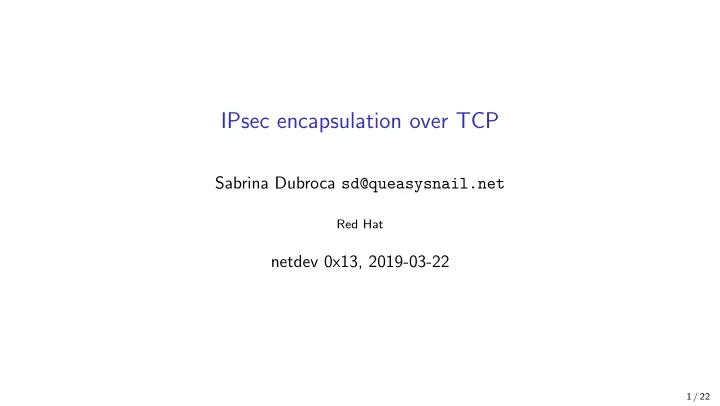

IPsec encapsulation over TCP Sabrina Dubroca sd@queasysnail.net Red Hat netdev 0x13, 2019-03-22 1 / 22
Introduction 2 / 22
ESP and IKE ◮ Components of the IPsec protocol suite ESP Encapsulating Security Payload AH Authentication Header IKE Internet Key Exchange ◮ Packet formats IP ESP Data Figure: ESP packet format IKE payload IP UDP IKE header Figure: IKE over UDP port 500 packet format 3 / 22
UDP encapsulation ◮ workaround for NAT: NAT needs ports to demultiplex inside/outside 0 8 12 UDP SPI SN Data Figure: ESP over UDP packet format 0 8 12 IKE payload UDP 0 IKE header Figure: IKE over UDP port 4500 packet format ◮ RX node uses the first 32 bits of UDP payload to differentiate ESP/IKE 4 / 22
More middlebox trouble Some middleboxes don’t let anything other than TCP pass. 5 / 22
RFC 8229: TCP Encapsulation of IKE and ESP Packets 6 / 22
RFC 8229: packet formats TCP stream, composed of concatenated messages 0 1 2 5 6 len SPI SN Data Figure: ESP over TCP message format 0 1 2 5 6 IKE payload len 0 IKE header Figure: IKE over TCP message format 7 / 22
RFC 8229: sender and receiver operations ◮ sender ◮ adds a prefix to each message ◮ for all messages: length (2 bytes) ◮ for IKE messages: non-ESP marker (like in UDP encapsulation) ◮ concatenates all messages within a TCP stream ◮ receiver ◮ parses TCP stream to extract messages ◮ differentiates ESP from IKE (SPI/non-ESP marker) ◮ handles each message 8 / 22
Linux implementation 9 / 22
XFRM ◮ infrastructure underneath linux kernel’s IPsec implementation ◮ applies transformations on packets 10 / 22
Upper Layer Protocol (ULP) ◮ infrastracture to implement in-kernel protocols that live on top of TCP ◮ for example, TLS ◮ init callback triggered by the TCP ULP setsockopt #define ULPNAME <...> setsockopt(sock, SOL_TCP, TCP_ULP, ULPNAME, sizeof(ULPNAME)); ◮ init callback can change some of the socket’s operations ◮ replace operations with protocol-specific actions ◮ for example, sendmsg/recvmsg, close 11 / 22
Stream Parser (strp) ◮ framework to parse messages out of a TCP stream ◮ main callbacks parse msg returns the length of the next message in the stream rcv msg processes the next message ◮ strp’s receive function ◮ triggered by arrival of new data on the TCP socket ◮ calls those operations 12 / 22
RFC 8229 implementation ◮ uses ULP ◮ initializes a streamparser on the TCP socket ◮ redefines socket operations ◮ streamparser ◮ extracts messages, either IKE or ESP ◮ passes messages to userspace or XFRM 13 / 22
RFC 8229 implementation: RX handling ◮ data arrives on TCP encap socket → strp rcv() → parse msg + rcv msg ◮ parse msg ◮ reads length field ◮ rcv msg ◮ reads SPI/non-ESP marker ◮ continues processing as ESP or IKE ◮ ESP messages → XFRM → decrypt/verify ◮ IKE messages → userspace queue → recv() (via custom recvmsg op) 14 / 22
RFC 8229 implementation: TX handling ◮ IKE daemon → send() → custom sendmsg op → add length prefix → enqueue to TCP ◮ data packets → XFRM → add length prefix → enqueue to TCP 15 / 22
RFC 8229 implementation: TX handling: interleaving of messages msg1: partially sent msg2: fully sent � �� � � �� � ... ... msg1, N bytes msg2, M bytes rest of msg1 len len � �� � ���� expected msg1 next len Figure: Interleaving problem between IKE and ESP ◮ avoid interleaving messages over TCP ◮ temporary slot in front of the TCP socket ◮ keep that partially-sent message in the slot 16 / 22
Userspace view 17 / 22
Userspace API: creating XFRM states ◮ almost identical to UDP encap: s/espinudp/espintcp/ CPORT=<local port of the client socket> SPORT=4500 CADDR=<IP address of the client> SADDR=<IP address of the server> ip xfrm state add src $CADDR dst $SADDR proto esp spi $SPI1 \ aead ’rfc4106(gcm(aes))’ $KEY $ICVLEN \ mode transport sel src $CADDR dst $SADDR \ encap espintcp $CPORT $SPORT 0.0.0.0 ip xfrm state add src $SADDR dst $CADDR proto esp spi $SPI2 \ aead ’rfc4106(gcm(aes))’ $KEY $ICVLEN \ mode transport sel src $SADDR dst $CADDR \ encap espintcp $SPORT $CPORT 0.0.0.0 18 / 22
Userspace API: client program sock = socket(AF_INET, SOCK_STREAM, 0); struct xfrm_userpolicy_info policy = { .action = XFRM_POLICY_ALLOW, .sel.family = AF_INET, }; policy.dir = XFRM_POLICY_OUT; setsockopt(sock, IPPROTO_IP, IP_XFRM_POLICY, &policy, sizeof(policy)); policy.dir = XFRM_POLICY_IN; setsockopt(sock, IPPROTO_IP, IP_XFRM_POLICY, &policy, sizeof(policy)); connect(sock, ...); send(sock, "IKETCP", 6, 0); setsockopt(sock, SOL_TCP, TCP_ULP, "espintcp", sizeof("espintcp")); 19 / 22
Socket behavior ◮ TCP socket, but behaves like a UDP socket once encapsulation is enabled ◮ length prefix added/removed by kernel ◮ non-ESP marker is userspace’s responsibility (identical to ESPINUDP encap) ◮ "IKETCP" prefix ◮ written sent by userspace client before enabling encapsulation ◮ read by userspace server (after accept()) before enabling encapsulation (otherwise, close connection) ◮ one send() = 1 IKE message ◮ MSG MORE not implemented ◮ one recv() = 1 IKE message ◮ recv buffer smaller than actual message ⇒ partial read, rest of the message dropped ◮ MSG PEEK returns the first N bytes of the message at the head of the receive queue 20 / 22
Conclusion 21 / 22
Remaining work ◮ Possible starvation issue between ESP and IKE ◮ Testing with IKE daemon ◮ Upstreaming 22 / 22
Recommend
More recommend